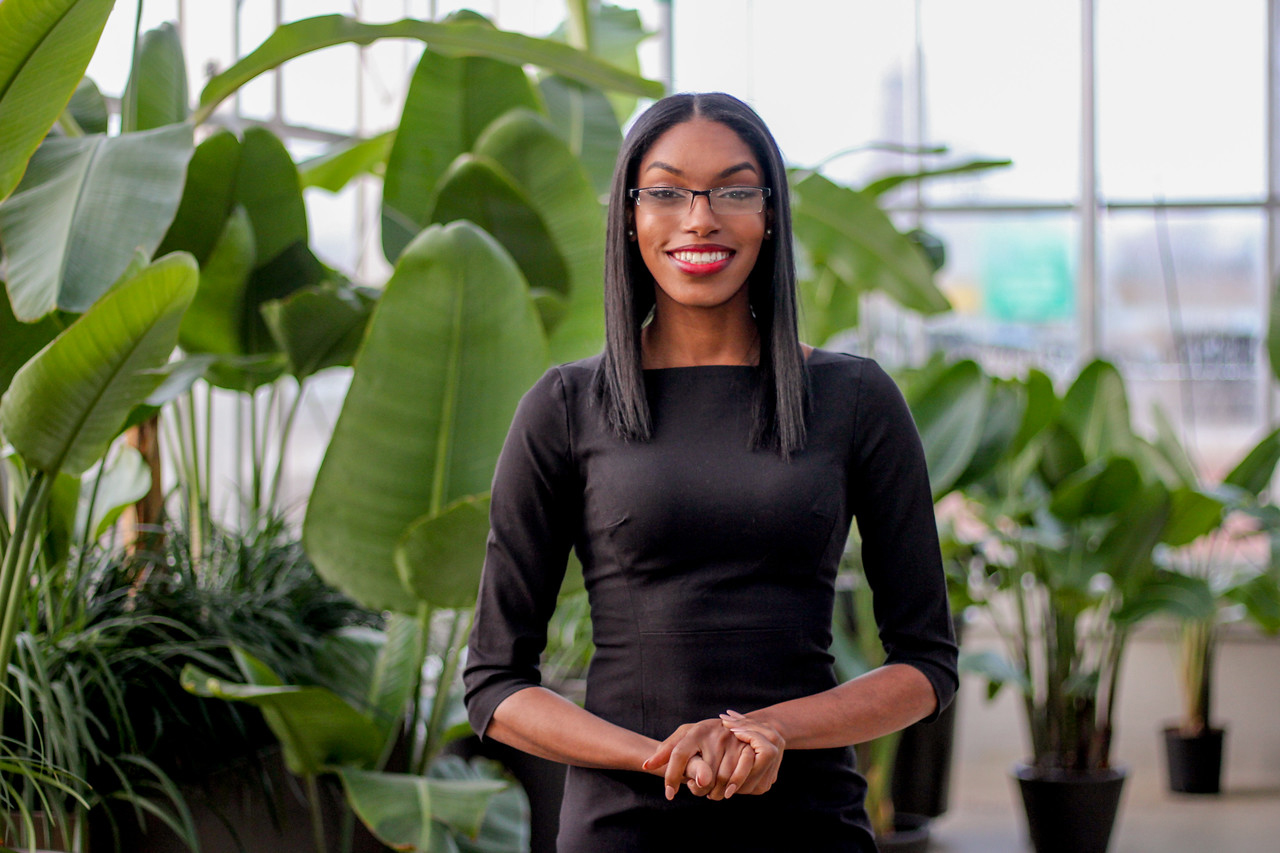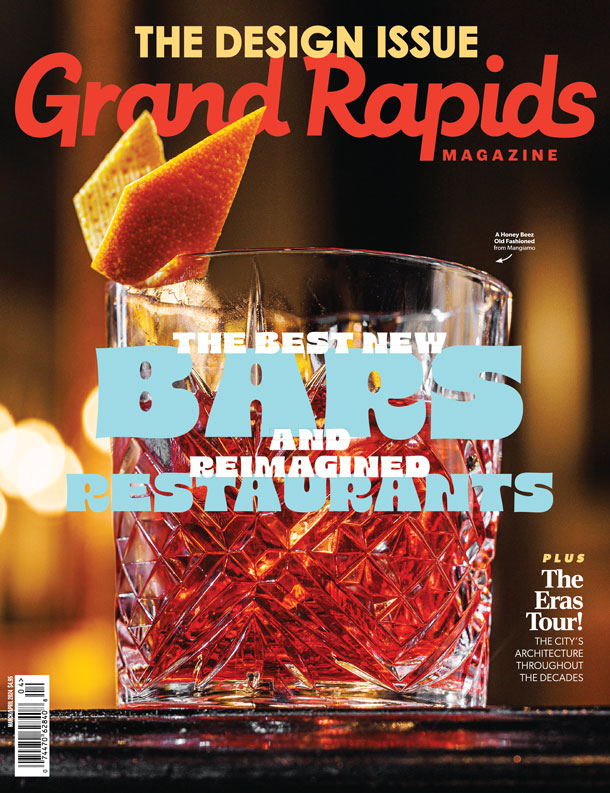Political Pulse hit the Grand Rapids airwaves in fall 2016. Denavvia Mojet, the program’s host, said her goal was to “bring critical discourse and education around local politics to the region’s urban listener in a way that was fun, engaging and honest.”
The program can be heard every Friday at 5 p.m. and Tuesday at noon on 97.3 the Beat.
Mojet said her interest in local politics stems from growing up in a poor Black community in Benton Harbor, Michigan, where community members were often frustrated with local governance and also unsure how to effectively fight for their interests.
Mojet’s conviction around the importance of community engagement in local politics grew even stronger during her teenage years following the passage of Michigan’s Emergency Manager law, which took away local control from several Michigan communities.

Mojet moved to Grand Rapids to attend Grand Valley State University and has remained in the city, becoming entrenched in the area’s political conversations. With Political Pulse, she is committed to creating a platform for the in-depth exploration of the most important political issues facing Grand Rapids, and the Black community in particular.
The program returned from its holiday hiatus earlier this month and GR|MAG spoke with Mojet to find out what to expect as the program continues to grow this year.
GR|MAG: What motivated you to start Political Pulse?
DM: I was motivated to start Political Pulse because I’ve always been passionate about bolstering civic engagement in communities of color. Growing up in a poor Black community in Southwest Michigan, Benton Harbor, I witnessed a great deal of community anger and frustration around the laws that governed our way of life coupled with a widespread ignorance of how to effectively engage in the process to legislate change.
This tension was heightened in large part by the imposed Emergency Manager legislation that plagued my teen years and in response to all that I saw going on around me. I became motivated to learn as much as I could about how government worked and how power consequently correlated to knowledge, money and votes. I realized that the more people of color understood about the government, the more empowered they would be to engage with it. Political Pulse was birthed from that epiphany.
GR|MAG: When did you first become interested in local politics and how does it impact your daily life?
DM: I’ve been a politics nerd since I was a kid. I was the dork who loved the Model United Nations conferences and the Michigan Interscholastic Forensic Association competitions where I could win by articulating my understanding of international politics and global power dynamics.
Today, I’m a 24-year-old millennial mother who brings her son to community meetings, marches and political events, I sit on boards and I consult on campaigns and I work full-time for a non-profit with a strong history in political advocacy, and in every election cycle, I vote. I believe all politics are local. All politics are about people. And as someone who operates out of a burning compassion for people and the world around me, politics is my life.
GR|MAG: Tell me a little about the format of your show and the types of guests you have on?
DM: The format of Political Pulse is pretty fluid. We record/broadcast for one hour and over the course of that time, there may be a panel, or a personal one hour interview with a guest or group, or even just me fielding calls from residents. But, we’re always exploring political topics/races that are most prominent in the community at that time.
For example, in the past, if the community was centering discourse on the race for Second Ward commissioner, guests on the show included candidates like commissioner Joe Jones and Tami VandenBerg. In races that impact jurisdictions larger than just the city of Grand Rapids, I have shared the platform with candidates like Chris Reader for county clerk, Alida Bryant for county prosecutor, Jeff Thomas for Congress and even Robert VanKirk for State House.
And, I step beyond just the people running for positions of influence. I have facilitated on-air live broadcasts with individuals like Patrick Miles Jr., former Barack Obama-appointed US Attorney, or with panels of activists and residents on topics like DACA, and I’ve even engaged local activist groups within the political arena like Voters Not Politicians (the movement to end gerrymandering), Equity PAC, the Amalgamated Transit Union (of local Rapid Bus employees during their labor dispute and transit millage boycott) and GR Proactive for Voter Mobilization.
I’ve even had the pleasure of broadcasting live a candidate forum from the LINC UP Gallery on millages. My guests vary a great deal but the goal is always the same — to connect my listeners to a person, an office, an organization or an issue that could be affecting them, their friends, their family or their neighborhood.
GR|MAG: What are some of the issues on your schedule for the next couple of episodes?
DM: For the next couple of shows, I am so excited to be covering some of the most complex and hard-hitting issues in the Greater Grand Rapids area for communities of color: policing and development/housing.
My guests will include individuals like the Hodges family, who since a December incident involving 11-year-old Honestie Hodges being handcuffed and detained by Grand Rapids Police, have been struggling to navigate the legal and institutional nuisances of seeking justice and inspiring use of force policy reform, and Michelle Covington from Inner City Christian Federation (ICCF).
GR|MAG: What are your goals for the show in the coming year?
DM: I think the goal in the upcoming year for me is to discuss systems/institutions. I’m hoping that the platform moves away from being a space for one-on-one conversations with candidates and grows into even more robust candid discourse around how the local political system/institutions are directly impacting urban residents. In deconstructing these systems/institutions, I hope to introduce listeners to potential opportunities to effect change.
GR|MAG: How can people listen to the episodes?
DM: People can listen to Political Pulse every Friday at 5 p.m. and Tuesday at noon on 97.3 the Beat. It’s also available via livestream on Facebook at Political Pulse with Denavvia Mojet and on Soundcloud for 97.3 the Beat.
GR|MAG: Is there anything else you’d like to add?
DM: I encourage people to not only listen to Political Pulse for themselves but to invite a friend, to share it with a family member, to discuss what they heard at work, and to even reach out to me with the thoughts, questions and ideas that are sparked from/during the show. I encourage people to call the station at 616-522-BEAT.
Editors Note: This interview has been minimally edited and condensed
*Photo courtesty of ACT Photo & Media Productions








Facebook Comments